Spring is here and with it, finally warmer, drier, sunny weather. It’s time to take the opportunity and get outdoors, and with that, a reminder to start protecting yourself against the harsh effects of the sun.
Sun Protection
You might think that springtime sun exposure is less dangerous than summer sun exposure – it isn’t as warm and therefore the sun must not be as strong – right? Wrong. UVA rays from the sun are consistent all year round – not just in the summer. So, take heed and protect your skin against sun damage and premature skin ageing.
Reef SPF 50 Sunscreen Oil Spray infused with coconut oil provides very high, broad-spectrum protection from the harmful effects of UVA and UVB rays. The moisturising oil formulation glides on, is fast drying and absorbs quickly to leave skin feeling soft and supple, and is scented with Reef’s signature coconut fragrance – the scent of summer. You can trust Reef’s SPF ratings, as their products are tested to meet the strict Australian quality standards.
Visit Reef to find out more about Sunscreen Oil Spray SPF 50
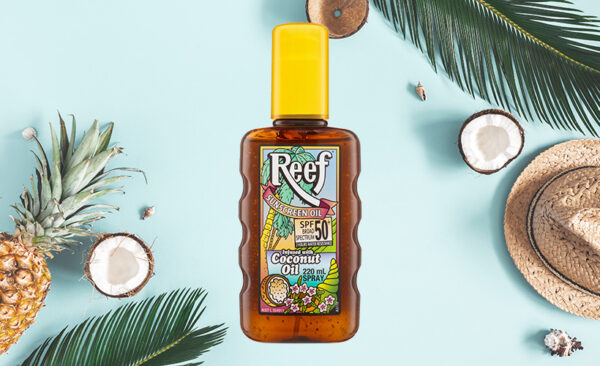
If you prefer a natural mineral sunscreen and want to cut two steps out of your skincare routine with a three-in-one product, try Invisible Zinc SPF 50 Sheer Defence Tinted Moisturiser. This is a lightweight moisturiser with high SPF, broad spectrum UVA & UVB mineral sunscreen protection with sheer tint formulated for sensitive skin. The single active ingredient, Zinc Oxide, acts as a barrier against the sun, reflecting UV radiation away. Use daily to nourish, protect and help prevent the appearance of premature aging of the skin caused by UV exposure.
Visit Invisible Zinc to find out more about Sheer Defence Tinted Moisturiser SPF 50
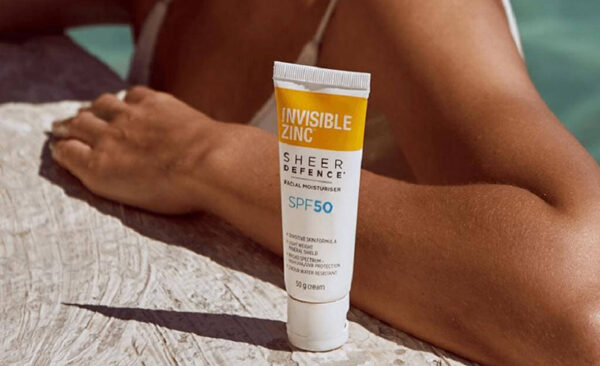
Sunscreen Tips
- Use a sunscreen that is SPF 30 or greater and water-resistant with broad spectrum coverage. The number indicates that if you are using it correctly, including reapplying it every two hours, it will take 30 times longer for you to turn red.
- Re-apply sunscreen every 1.5 to 2 hours. If you’re sweating or in water, reapply more often.
- Always make sure to check that your sunscreen hasn’t expired. Toss it if it’s past the expiry date printed on the container or hasn’t been stored correctly as sunscreens will become less effective at blocking damaging UV rays.
- Always apply sunscreen 20 minutes before going outside. It takes time to absorb into your skin. To achieve proper protection, you should use approximately two milligrams of sunscreen per square centimeter of skin. This is about two tablespoons on all of your exposed areas.
- Don’t forget to use sunscreen on the tops of your feet, ears, scalp and lips. We often forget these areas and without proper protection they are prone to a higher risk of skin cancer.
- Always use a sunscreen that is designed for your face. Increase your sun protection by wearing sunglasses, a hat and protective clothing.
- Limit sun exposure between 10am and 2pm – as this is when the sun is strongest.
Seasonal Allergies
The change in weather also brings with it the beginning of the allergy season. The Asthma and Respiratory Foundation NZ (ARFNZ) is warning people with allergies and asthma to prepare for an intense spring and summer, as forecasts indicate ideal conditions for pollen production.
Prepare for an intense spring and summer for allergies
NIWA meteorologist Ben Noll explains that a warmer than average start to the year, coupled with the wettest July on record means the stage is set for strong plant growth and associated pollen production.
ARFNZ Chief Executive Letitia Harding advises everyone with allergic asthma to ensure they have an up-to-date Asthma Action Plan, so they know what to do if their asthma is triggered or worsened by pollen. She also recommends that people keep their medications with them at all times.
Tips and Tricks to Help with Spring Allergies
Seasonal allergic rhinitis (otherwise known as ‘hayfever’), occurs when pollen and mould spores enter your home, car, clothes and even your nose, throat and eyes, causing sneezing, a runny nose, headaches and itching of the nose, eyes, roof of the mouth and back of the throat. Airborne substances can also affect the lining of the lungs, causing wheezing or allergic asthma.
Here are our top tips for avoiding these everyday allergens and the foggy haze they propel us into.
1. Boost your immunity
Even though allergies are better treated by clinical diagnosis and treatment, giving a boost to our immune system can help our experience with symptoms.
Comvita Olive Leaf Extract is an everyday antioxidant support for general wellbeing. Traditionally used in Western Herbal Medicine for immune Support.
Visit Comvita to find out more about Olive Leaf Extract
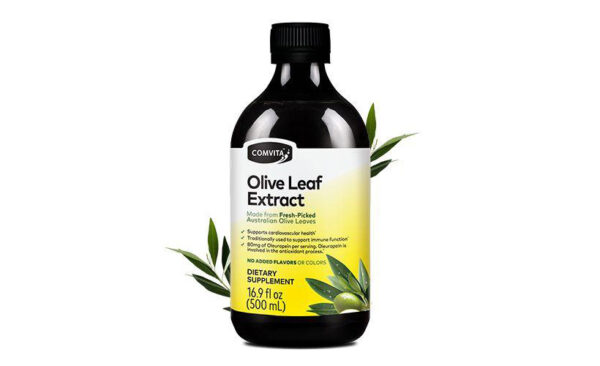
2. Support your energy and wellbeing
NatureBee Potentiated Bee Pollen is a 100% natural vegetable superfood that supports your overall health and well-being. There’s virtually no other substance on the planet that has as many naturally occurring nutrients. Amongst many other benefits, it supports sustained energy and your body’s natural immunity, it also supports digestion, sleep and mental alertness.
Visit NatureBee to find out more about Power Pollen
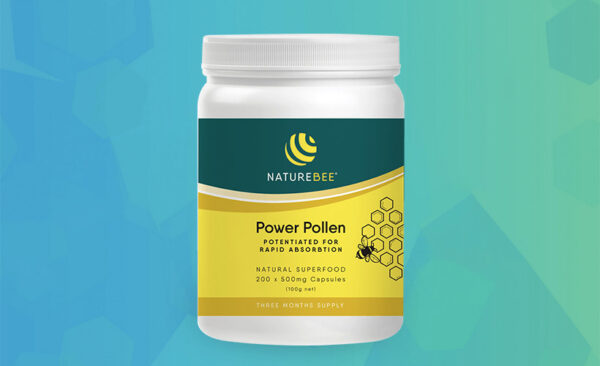
3. Have a treatment on hand
Antihistamines are the cornerstone treatment for allergy symptoms, and most are readily available from the pharmacy. But while they combat the effects of histamine, they can’t stop its production. Antihistamines help relieve the runny nose, itchy skin and swelling that comes with allergies. They come in tablets, nasal spray or eye drops, in both non-sedating and sedating preparations (which are useful when sleep is impaired).
Where antihistamines can’t help, corticosteroids may be prescribed. They’re available in a nasal spray to treat nasal symptoms, and in inhalers to treat asthma.
Soothe itchy, tickly throats with Comvita™ Mānuka Honey Lozenges and Kids Pops. Made with Comvita’s genuine UMF™ 10+, the Zesty Lemon Lozenges are individually wrapped to keep them fresh and are ideal for on-the-go relief.
Visit Comvita to find out more about Mānuka Honey Lozenges
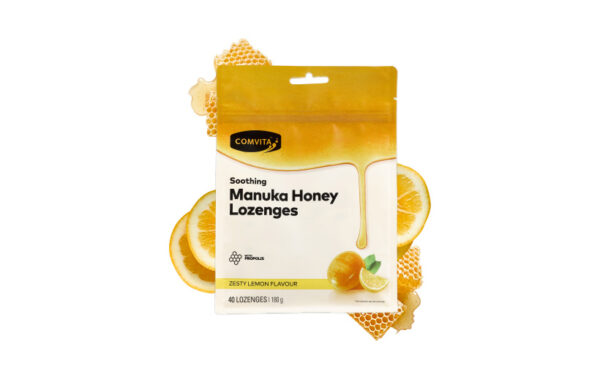
The great-tasting Comvita™ Kids Soothing Pops contain Comvita’s UMF™ 10+ Mānuka honey, ideal for soothing tickly coughs and throats. They contain no artificial colour or flavours, are non-GMO & gluten-free and come in 3 delicious flavours that kids enjoy: grape, orange, and lemon.
Visit Comvita to find out more about Kids Soothing Pops
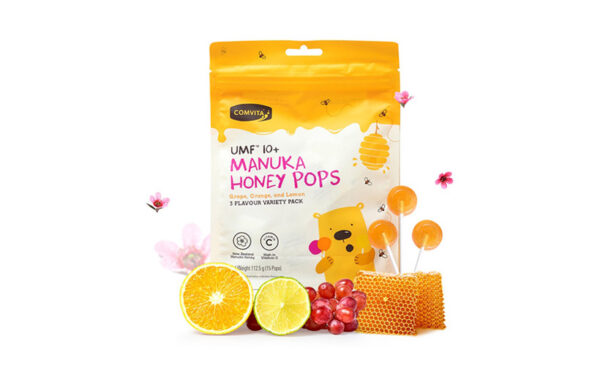
With pollen counts at their highest in the morning, and worse on hot, sunny days, here are some tips to avoid pollen:
- Keep windows and doors closed in the early morning when pollen is at its peak
- Plan outdoor activities for the afternoon.
- Have a shower after time spent outside (to wash off pollen from your skin and hair), especially before bed to avoid triggering symptoms overnight.
- Avoid hanging clothes and bedsheets outside to dry, especially on windy days, as they’ll collect pollen.
- Don’t do the gardening
- Consider planting a ‘low-allergen’ garden made up of brightly-coloured flowers that should attract bees and other insects to transfer pollen (so that it doesn’t become airborne).
- Try and keep your car windows shut during spring/summer,
With these tips, we hope you enjoy the next few months of spring! Enter our giveaway here for a chance to win some great prizes to help you enjoy your time outdoors!





















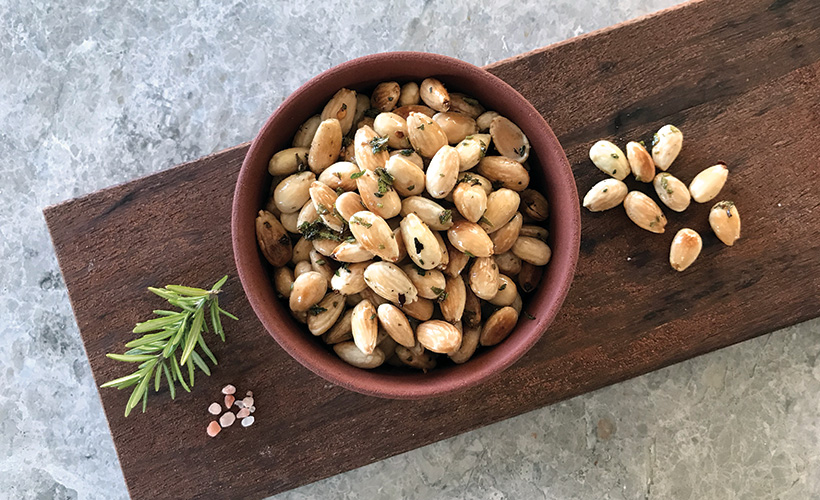

Community